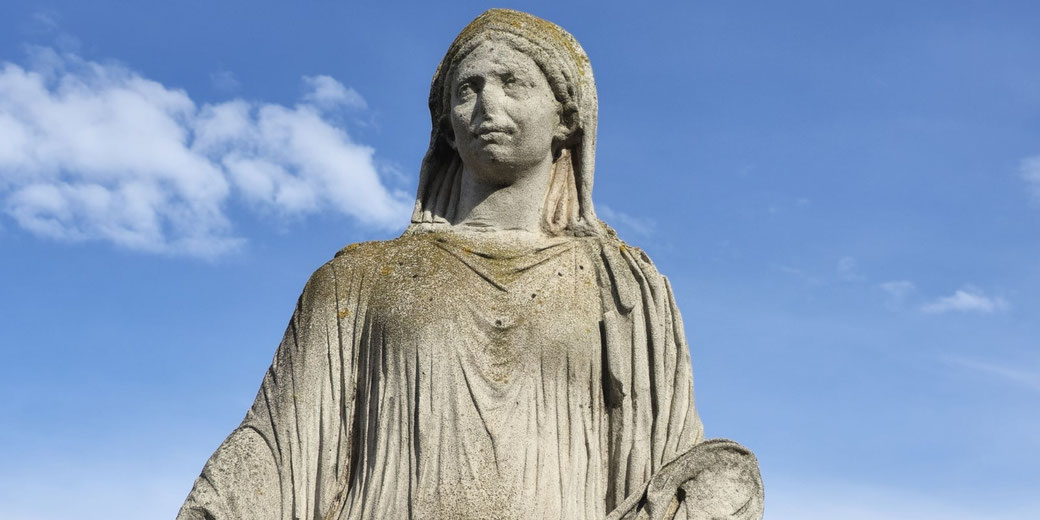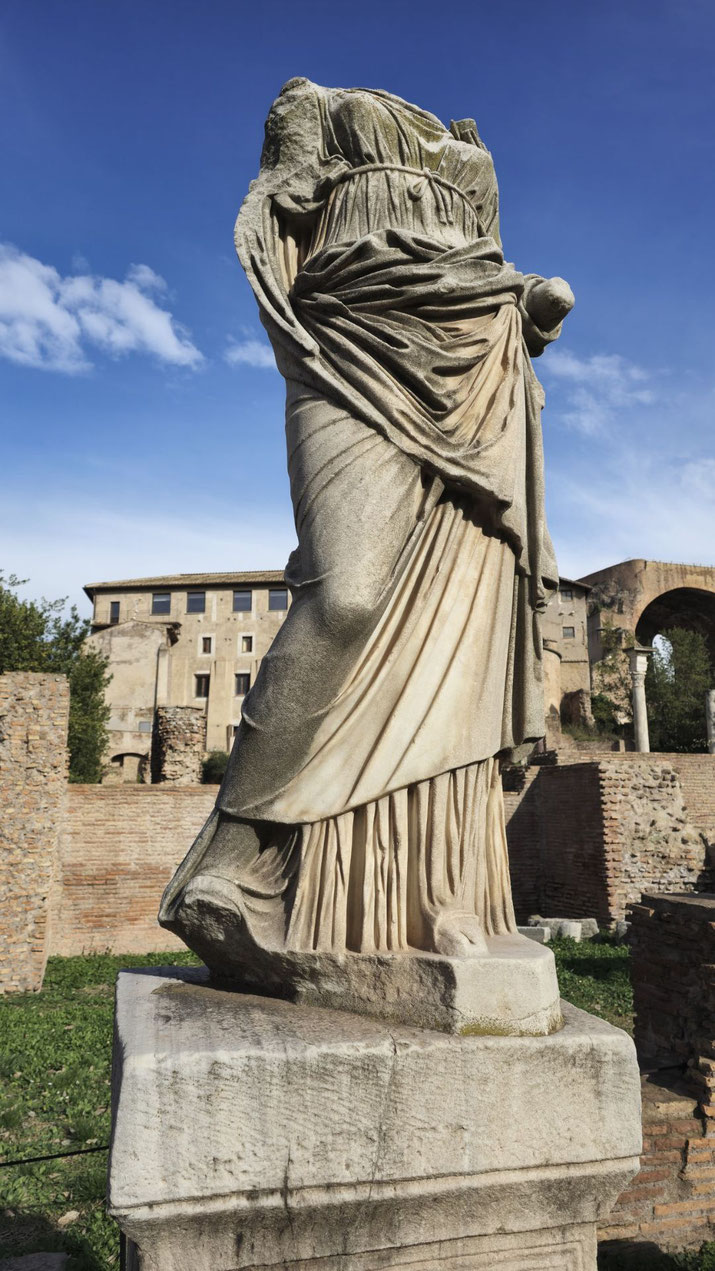The Bona Dea Scandal: How a women's only event almost destroyed Julius Caesar's political career

In 62 BC, a scandal ignited around the secretive and sacred festival of Bona Dea, held at the home of Julius Caesar.
Exclusively attended by women, with men strictly forbidden from participating or even knowing the rites performed, was thrown into disarray when a wealthy patrician with a penchant for controversy, disguised himself as a woman and infiltrated the festival.
Public outrage followed that intertwined angry around religious sacrilege, political rivalry, and personal vendettas.
What was the Bona Dea Festival?
Bona Dea, whose name translates to the “Good Goddess,” was a deity revered in Ancient Rome, embodying fertility, healing, and chastity.
She was considered a protectress of the Roman state and its people, particularly women, to whom she offered aid in matters of fertility and childbirth.
The goddess was often depicted seated, holding a cornucopia – a symbol of abundance and prosperity – and a serpent, representing healing and regeneration.
Her worship was shrouded in mystery and secrecy, with many of her rites and attributes concealed from the public and, notably, from men.
The annual festival in honor of Bona Dea was one of the most significant events associated with her worship.
Held in December, the festival was hosted by the wife of the sitting magistrate, and in the year of the scandal, it took place at the residence of Julius Caesar, the Pontifex Maximus at the time.
The festival was a women-only affair, with men strictly prohibited from participating or even learning about the proceedings.
The exclusion of men was so stringent that male servants were replaced by female attendants, and portraits of men in the hosting house were covered.
During the festival, the hosting home was transformed into a sanctified temple, where sacrificial offerings of sow’s entrails and libations of wine were made to invoke the goddess’s favor.
The rites performed were kept secret, but it is believed that they included prayers for fertility and the well-being of the Roman state.
The atmosphere was one of revelry and liberation, where women could indulge in wine, which was otherwise restricted, and speak freely about their lives and experiences.

The key figures of the scandal
At the center of the scandal was Publius Clodius Pulcher, a patrician known for his audacity and penchant for controversy.
Clodius, with his daring act of infiltrating the sacred festival disguised as a woman, ignited the fuse of a scandal that would engulf Rome.
The motivations behind his actions have been the subject of much speculation and debate, ranging from political ambition to illicit romance.
Regardless of his intent, Clodius found himself at the heart of a religious and political maelstrom, facing trial and ignominy.
Julius Caesar, the Pontifex Maximus and one of the most influential figures in Rome, was inevitably drawn into the scandal.
The festival was held at his residence, and his wife, Pompeia, played a central role as the hostess of the event.
Caesar’s involvement and the subsequent trial had lasting implications for his political career and personal life, highlighting the delicate balance between public image and private affairs in Roman society.
Pompeia, Caesar’s wife, found herself in an unenviable position, caught between scandal and societal expectations.
As the hostess of the Bona Dea festival, Pompeia was responsible for maintaining the sanctity and secrecy of the rites.
The infiltration by Clodius raised questions about her complicity and integrity.
Pompeia’s predicament underscores the challenges faced by women in Roman society, where reputation and honor were closely guarded and easily tarnished.
Another notable figure in the scandal’s narrative was Cicero, the renowned orator and statesman.
Cicero played a crucial role in the legal proceedings that followed, using his eloquence and influence to shape the outcome of Clodius’ trial.
His involvement in the Bona Dea Scandal showcased the interplay of law, politics, and personal rivalry in Ancient Rome, with Cicero navigating the turbulent waters of Roman power dynamics.
How the scandal unfolded
In 62 BC, the halls of Julius Caesar’s residence were abuzz with anticipation as Roman matrons gathered to celebrate the Bona Dea festival.
The air was laden with the scent of sacrificial offerings and the sound of hushed prayers, as women from diverse strata of society reveled in the sacred rites and communal bonds.
Unbeknownst to them, an uninvited guest was lurking in their midst. Publius Clodius Pulcher, cloaked in the guise of a woman, had infiltrated the sanctity of the festival.
The masquerade, however, was short-lived. The sharp eyes of a maidservant pierced through Clodius’ disguise, unraveling his true identity.
The revelation sent ripples of shock and outrage among the attendees, transforming the sacred atmosphere into a cauldron of chaos.
The sanctity of the Bona Dea festival had been violated, the sacred space profaned by the presence of a man.
The immediate aftermath was a whirlwind of accusations and recriminations, with Clodius’ sacrilege becoming the talk of the town.
Julius Caesar, despite his own absence from the festival, was thrust into the eye of the storm.
The scandal cast shadows of doubt and suspicion on his household, particularly on Pompeia, who was implicated by virtue of her role as the hostess.
Caesar’s response was decisive; he severed his marital ties with Pompeia, underscoring the importance of reputation and honor in the political and social landscape of Rome.

The legal and political ramifications
The immediate aftermath saw Publius Clodius Pulcher, the central figure of the scandal, facing the formidable Roman legal system.
Accused of profaning sacred rites, Clodius stood trial, a spectacle that drew the attention of Rome’s citizens and elite alike.
The courtroom became a battleground, where legal arguments intertwined with political maneuvering and personal rivalries.
One of the most prominent figures to emerge in the legal proceedings was Cicero, the renowned orator and statesman.
Armed with eloquence and a keen sense of justice, Cicero played a pivotal role in shaping the narrative of the trial.
His involvement, however, was not solely driven by a pursuit of justice; it was also a reflection of the intricate web of political relationships and animosities that characterized Roman society.
Despite the compelling evidence and the gravity of the charges, Clodius managed to secure acquittal, a verdict that raised eyebrows and questions about the integrity of the Roman legal system.
The acquittal was seen by many as a manifestation of corruption and political influence, underscoring the challenges and contradictions inherent in the pursuit of justice in Rome.
Beyond the courtroom, the Bona Dea Scandal had far-reaching political ramifications.
Julius Caesar, whose household had been the stage for the scandal, faced scrutiny and speculation.
Caesar’s reaction to the scandal was swift and decisive; he sought a divorce from Pompeia, famously stating that “Caesar’s wife must be above suspicion.”
The scandal and its aftermath highlighted the delicate balance between personal life and political career in Roman society, where public image was closely intertwined with political success.
The religious implications for women in Rome
The immediate response to the scandal was a call for purification and atonement. The sanctity of the religious space had to be restored, and the anger of the gods appeased.
Rituals of purification were performed, and sacrifices offered, in a bid to placate the divine and restore the delicate balance between the human and the supernatural.
The scandal underscored the Romans’ belief in the active presence of the gods in their lives and the importance of maintaining harmonious relationships with the divine through adherence to religious rites and traditions.
Furthermore, the Bona Dea Scandal brought to the fore the role of women in Roman religion.
The festival was a unique space for women to exercise religious agency and commune with the divine, away from the male-dominated religious hierarchy of Rome.
The violation of this female-centric religious space highlighted the vulnerabilities and challenges faced by women in exercising their religious roles and rights.
The scandal sparked discussions and reflections on the place of women in Roman religious life and the need to protect and preserve female religious agency.
What do you need help with?
Download ready-to-use digital learning resources
Copyright © History Skills 2014-2025.
Contact via email
With the exception of links to external sites, some historical sources and extracts from specific publications, all content on this website is copyrighted by History Skills. This content may not be copied, republished or redistributed without written permission from the website creator. Please use the Contact page to obtain relevant permission.





